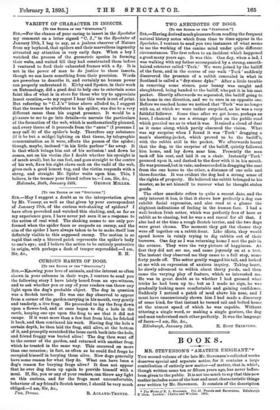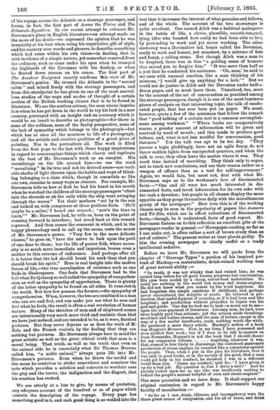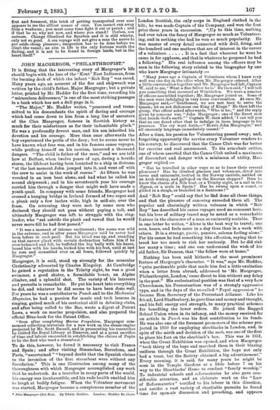BOOKS.
MR. STEVENSON'S "AMATEUR EMIGRANT."* THE second volume of the late Mr. Stevenson's collected works deserves special and separate notice, for it contains a large contribution of entirely new matter—of matter, that is, whicf,, though written some ten or fifteen years ago, has never before been given to the public. It is not too much to say that this new matter includes some of the best and most characteristic things ever written by Mr. Stevenson. It consists of the description • The Works of R. L. Stevenson. Vol. II. Travels and Exawrsions. Edinburgh E 'Won. London : Chatto and Windue. 1E35.
of his voyage across the Atlantic as a steerage passenger, and forms, in fact, the first part of Across the Plains and The Silverado Squatters. In our recent attempt to estimate Mr.
Stevenson's place in English literature—an attempt made on the news of his death—we expressed the opinion that he was invariably at his best when using his superlative gift of style, and his mastery over words and phrases, to describe something which had come within his own vision—in dealing, that is, with incidents of a simple nature, yet somewhat removed from the ordinary, such as came under his eyes when he tramped the highlands of the Cevennes with his donkey, or when he floated down stream on his canoe. The first part of The Amateur Emigrant exactly confirms tijis view of Mr. Stevenson's genius. He crossed the Atlantic in the "second cabin" and mixed freely with the steerage passengers, and
from this standpoint he has given us one of the most marvel- lous studies of the ways and modes of thought of a certain
section of the British working classes that is to be found in literature. We see the restless artisan, the man whose impulse it is when he has got down in the world to try his luck in a new country, portrayed with an insight and an accuracy which it would be an insult to describe as photographic—for there is none of the coldness, none of the faulty perspective, none of the lack of sympathy which belongs to the photograph—but which has at once all the nearness to life of a photograph, and all the artistic and creative qualities of a great piece of painting. Nor is the portraiture all. The work is filled from the first page to the last with those happy inspirations in regard to commonplace things which charm and captivate in the best of Mr. Stevenson's work as an essayist. His
moralisings on the life around him—we use the word 4‘ moralising " in its true and not its derived sense—are verit- able shafts of light thrown upon the habits and ways of think- ing belonging to a class which, though in essentials so like our own, remains in many ways so obscure. For example, Mr. Stevenson tells us how at first he had his heart in his mouth when he watched the children of the steerage passengers "climb into the shrouds or on the rails while the ship went swinging through the waves." Yet their mothers " sat by in the sun and looked on with composure at these perilous feats. He'll maybe be a sailor,' I heard one remark ; now's the time to learn." Mr. Stevenson had, he tells us, been on the point of running forward to interfere ; but stood back at this remark reproved. And then comes the comment in which, and in the happy phraseology used to call up the scene, rests the secret of Mr. Stevenson's power. "Very few in the more delicate classes," he goes on, " have the nerve to look upon the peril of one dear to them ; but the life of poorer folk, where neces- sity is so much more immediate and imperious, braces even a mother to this extreme of endurance. And perhaps after all it is better that the lad should break his neck than that you should break his spirit." Here is real insight into the motive forces of life,—the true moralisation of existence such as one finds in Shakespeare. One feels that Stevenson had to the full what De Quincey so well called the sympathy of comprehen- sion as well as the sympathy of approbation. There is plenty of the latter sympathy to be found on all sides. It runs riot in the world. But how few possess the former,—the sympathy of comprehension. When, however, the two are combined in a man who can see and feel, and can make you see what he sees and feel what he feels, the result is often a real revelation of human nature. Many of the sketches of men and of shipboard scenes are intentionally very much more vivid and realistic than that we have just noticed, and are intended to be, as it were, finished pictures. But they never depress us as does the work of M. Zola and the French realists, by the feeling that they are nothing but pictures. Mr. Stevenson always bore in mind the great artistic as well as the great ethical truth that man is a moral being. That truth, as well as the truth that even on the animal side he is essentially what Sir Thomas Browne -called him, "a noble animal," always puts life into Mr. Stevenson's pictures. Even when he draws the sordid and the mean he contrives to strike somewhere and somehow the note which provides a solution and converts to worthier uses the pity and the terror, the indignation and the disgust, that his creation has evoked.
We are utterly at a loss to give, by means of quotation, any adequate account of the hundred or so of pages which -contain the description of the voyage. Every page has something good in it, and each good thing is so welded into the text that it increases the interest of what precedes and follows, and of the whole. The account of the two stowaways is
quite excellent. One named Alick was a habitual malingerer in the battle of life, a clever, plausible, smooth-tongued, lying idler who boasted how easily he had been able to live, by pretending to work and yet never working. The other stowaway was a Devonshire lad, hence called the Devonian, ready to work and honest, yet somehow, by a mixture of fate and fancy, a rolling stone. But though Alick was a man to be despised, there was in him " a guiding sense of humour that moved you to forgive him." "It was more than half as a jest that he conducted his existence. Oh, man,' he said to me once with unusual emotion, like a man thinking of his
mistress, I would give up anything for a lark." But we could not do justice to Alick and the Devonian under half-a-
dozen pages, and so must leave them. Unnoticed, too, must be the account of the art of conversation as practised among the steerage passengers, though it is one of the most luminous pieces of analysis on that interesting topic, the talk of unedu- cated people, that has ever been put on paper. We must, however, quote a few of the sentences that follow the remark that "good talking of a certain sort is a common accomplish- ment among workmen." " Where books are comparatively scarce, a greater amount of information will be given and received by word of month ; and this tends to produce good talkers, and, what is not less needful for conversation, good listeners." Yet the talk was apt to be too dry. " They pursue a topic ploddingly, have not an agile fancy, do not throw sudden lights from unexpected quarters, and when the talk is over, they often leave the matter where it was. They mark time instead of marching. They think only to argue, not to reach new conclusions, and use their reason rather as a weapon of offence than as a tool for self-improvement." Again, we would fain, but must not, deal with what Mr.
Stevenson says as to the workman's love of disconnected facts :—" One and all were too much interested in dis- connected facts, and loved information for its own sake with too rash a devotion ; but people in all classes display the same appetite as they gorge themselves daily with the miscellaneous gossip of the newspaper." How true this is of the working classes may be seen in the popularity of papers like Answers and Tit-Bits, which are in effect collections of disconnected facts,—though, be it understood, facts of good report. Mr. Stevenson fastens on to this reflection an excellent gibe at the
newspaper-reader in general :—" Newspaper-reading, as far as
I can make out, is often rather a sort of brown study than an act of culture." The present writer at least pleads guilty. To him the evening newspaper is chiefly useful as a ready intellectual sedative.
Before we leave Mr. Stevenson we will quote from the chapter of " Steerage Types " a portion of his inspired por- trait of Mackay,—a materialistic, drink-ruined working man of great natural ability :—
" In truth, it was not whisky that had ruined him; he was ruined long before for all good human purposes but conversation. His eyes were sealed by a cheap, school-book materialism. He could see nothing in the world but money and steam-engines. He did not know what you meant by the word happiness. He had forgotten the simple emotions of childhood, and perhaps never encountered the delights of youth. He believed in pro- duction, that useful figment of economy, as if it had been real like laughter ; and production without prejudice to liquor was his god and guide. One day he took me to task—a novel cry to me— upon the over-payment of literature. Literary men, he said, were more highly paid than artisans ; yet the artisan made threshing- machines and butter-churns, and the man of letters, except in the way of a few useful handbooks, made nothing worth the while. He produced a mere fancy article. Mackay's notion of a book was Hoppus's Measurer. Now, in my time, I have possessed and even studied that work ; but if I were to be left to-morrow on Juan Fernandez, Hoppus's is not the book that I should choose for my companion volume Anything, whatever it was, that seemed to him likely to discourage the continued passionate production of steam-engines, he resented like a conspiracy against the people. Thus, when I put in the plea for literature, that it was only in good books, or in the society of the good, that a man could get help in his conduct, he declared I was in a different world from him. Damn my conduct,' said he ; I have given it up for a bad job. My question is, Can I drive a nail P ' And he plainly looked upon me as one who was insidiously seeking to reduce the people's annual bellyful of corn and steam-engines."
One more quotation and we have done. It shall support our original contention in regard to Mr. Stevenson's happy faculty of moralisation :— " As far as I saw, drink, idleness, and incompetency were the three great causes of emigration, and for all of them, and drink
first and foremost, this trick of getting transported over seas appears to me the silliest means of cure. You cannot run away from a weakness ; you must some time fight it out or perish ; and if that be so, why not now, and where you stand? Coelum, non animten. Change Glenlivet for Bourbon and it is still whisky, only not so good. A sea voyage will not give a man the nerve to put aside cheap pleasure; emigration has to be done before we climb the vessel; an aim in life is the only fortune worth the finding, and it is not to be found in foreign lands, but in the heart itself."




































 Previous page
Previous page